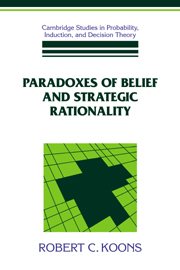Summary
I have shown that the careful investigation of such phenomena as mutual belief and strategic rationality leads inexorably to the confrontation of liar-like paradoxes. Affliction by such paradoxes is independent of the postulation of objects of belief with the kind of syntactic structure that makes self-reference (in the style of Gödel) possible. Hence, the paradoxes cannot be taken as providing good reason for rejecting such a postulate. Moreover, I have shown that a syntactic, computational theory of mental attitudes is compatible with a very attractive way of resolving the paradoxes: the context-sensitive solutions discussed in Chapters 6 and 7.
These results have significant implications for the philosophy of mind. One very attractive strategy for the philosophical materialist is to identify mental states and processes with computational states and processes. A mental process, for example, is identified with the internal processing of some representational structure. The phenomenon of liar-like paradoxes poses a prima facie challenge to such a strategy, since syntactically structured representations in the brain would permit the kind of pernicious self-reference that has traditionally been taken to be essential to the paradoxes. The challenge has now been effectively met.
Another striking implication of the context-dependent approach to the paradoxes is the inherent limitation on the comprehensiveness of thought that this context dependency imposes. Each individual thought is necessarily about some partial, limited part of the world: a truly comprehensive perspective (commonly referred to as a “God's-eye view”) is impossible. At the same time, this limitedness can to some extent be overcome by means of the schematic representations discussed in Appendix C.
- Type
- Chapter
- Information
- Paradoxes of Belief and Strategic Rationality , pp. 150 - 152Publisher: Cambridge University PressPrint publication year: 1992



